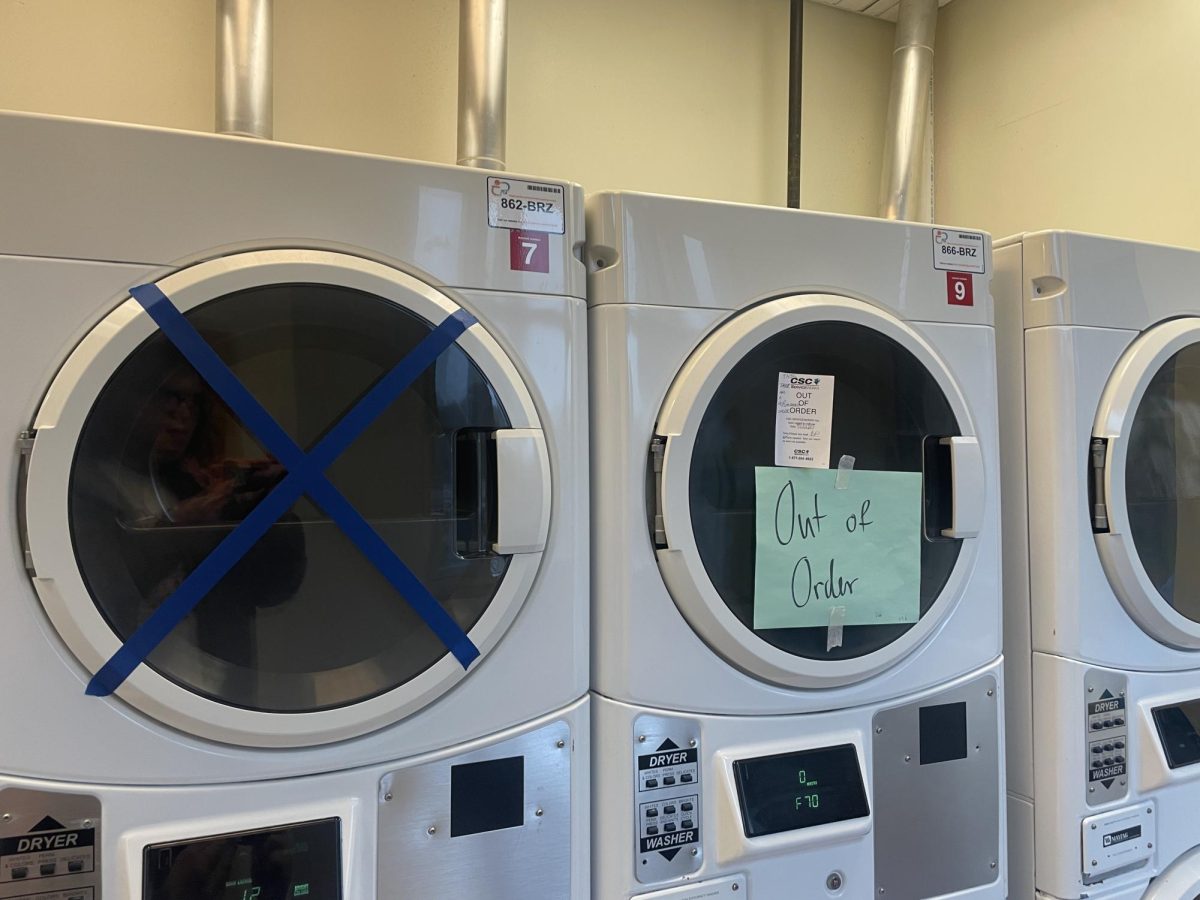Starting in 2010, Case Western Reserve University has provided laundry rooms to students free of charge. However, these machines are frequently subject to malfunction and interoperability for weeks on end, leaving students not only disappointed, but stuck with a pile of unwashed clothes.
Among UAA universities, CWRU is rather unique for offering free laundry; Emory University is the only other one to do so. Carnegie Mellon University has a similar one-time payment that they require all students to purchase if they live in a residence hall with laundry facilities.
“Laundry maintenance has been a long-standing issue at Case Western Reserve University,” Nandita Patil, vice president of residential services, and Patrick Wang, executive president of CWRU’s Residence Hall Association, said in a joint email.
In the beginning of November, the university told The Observer that “18 of the 245 machines need to be serviced or are waiting for parts.” However, this number is likely far greater. After visiting multiple laundry rooms in first-year and upperclassman residence halls, we found 18 of 165 machines out-of-order.
LaundryView leads us to believe the situation is even more bleak. The application claims that out of first-year, second-year and upperclassman housing, 87 machines are out-of-order as of Nov. 26.
While LaundryView has shown some discrepancies to the university’s estimations, it’s important to note that it’s not very accurate either. Sherman and Raymond residence halls displayed no working machines, when examined, all of them appeared to be in operation.
Still, the fact that the LaundryView sometimes displays incorrect information leads to frustration. Oftentimes, students recall memories from when the laundry machines were not working. One student recalled the time he had to call a friend to use their machines as “only one washer and one dryer [were] properly functioning in Hitchcock.” Likewise, another student in Michelson recounted a moment of frustration when none of the hall’s machines were operational and nearby residence halls had just one or two functioning machines.
Most of the machines in laundry halls were manufactured in 2015, and 86 of the 87 broken machines we saw were manufactured that 2015. This corresponds to when CWRU switched online laundry services providers from eSuds to LaundryView.
“We believe that this increase [in laundry-related maintenance issues] is due to two factors: an influx of students living on-campus who may be new to using the machines and a failure of the external vendor to accommodate this rise in usage,” Patil and Wang said.
The external vendor, CSC ServiceWorks, is contracted by CWRU to perform maintenance operations on the laundry machines. This means when students fill out a maintenance request for a washer or dryer, CWRU Housing does not assign one of their mechanics to fix it, but instead forwards it to CSC, who sends their own mechanic and parts to CWRU.
Patil and Wang emphasized that they are not blaming the students for the laundry intuition. “It should have been the vendor’s responsibility to both anticipate and address the issues in a timely manner by, for example, increasing the presence of maintenance technicians on campus for the first few weeks of the semester.”
CSC ServiceWorks and CSC ServiceWorks Academic Division, the branch which primarily deals with colleges, did not respond to requests for comment.
Adam Goodman, a fourth-year electrical engineering student, noted how one day in spring 2021 he reserved the email address “laundryappliances@case.edu” for an April Fools Day prank. He then created out-of-order signs and attached them to his building’s machines.
“Due to a combination of low building occupancy and the fact that April Fool’s was on an unpopular laundry day—Thursday—I was worried that most people would not have been able to experience my trickery,” Goodman said. “I therefore did what any good CWRU students pissed off at admin would do—an Instagram rant about how admin never has its sh*t together, about how I pay $9,000/year for room and board but would have to do laundry in Wade Lagoon, and the rest of the works.”
Patil and Wang empathized with the struggle of doing laundry on campus: “When machines are inoperable, residents have to carry their laundry to neighboring buildings, wait until inconvenient times for working machines to free up, turn to external paid services for a necessary service their housing costs should already cover, or forgo clean laundry entirely for weeks before the machines are fixed.”
Patil and Wang mentioned some of the short-term fixes they have helped lead the charge on, including storing spare parts and machines physically on CWRU’s campus and increasing the number of laundry technicians on campus. These are changes that the university is also keen to champion.
Patil and Wang announced that in the summer, CWRU will begin the bidding process for a new laundry contract.
They said regarding the process of these negotiations, “We are currently in talks of having a student representative who has experience with laundry initiatives to be a part of the bid evaluation process, allowing for additional student involvement in the laundry experience at CWRU.”




